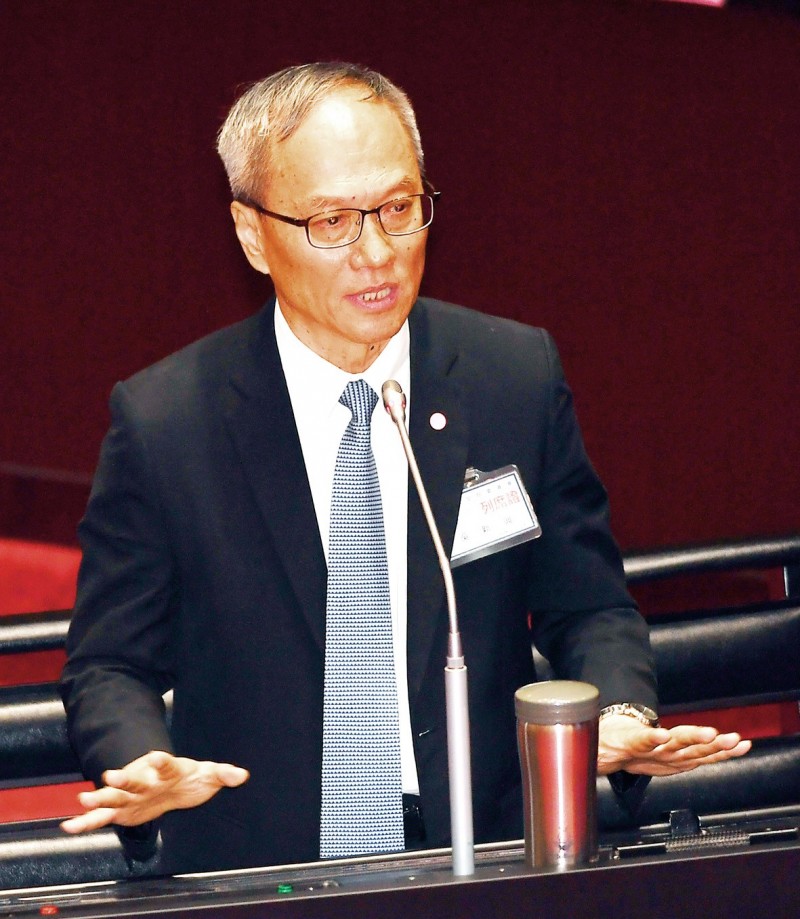《TAIPEI TIMES》Nominee Wu questioned on ‘consensus’

Examination Yuan nominee Wu Hsin-hsing attends a review meeting at the Legislative Yuan in Taipei yesterday. Photo: CNA
PRO-UNIFICATION? Examination Yuan nominee Wu Hsin-hsing said that he has been consistent in his support for Taiwanese sovereignty, freedom and democracy
By Hsieh Chun-lin and Jake Chung / Staff reporter, with staff writer
Examination Yuan member nominee Wu Hsin-hsing (吳新興) yesterday faced tough questions from Chinese Nationalist Party (KMT) lawmakers about his position on the so-called “1992 consensus,” even as the party itself appears to be split over the issue.
The Legislative Yuan has been reviewing the Presidential Office’s proposed nominees for the Examination Yuan, including Wu, 68, a former Overseas Community Affairs Council minister.
Citing Wu’s published works, KMT Legislator Charles Chen (陳以信) said that the nominee appeared to support the “1992 consensus” before he worked for the government and could even be said to be a pro-unification advocate.
The “1992 consensus” — a term that former Mainland Affairs Council chairman Su Chi (蘇起) in 2006 admitted making up in 2000 — refers to a tacit understanding between the KMT and the Chinese Communist Party (CCP) that both sides of the Taiwan Strait acknowledge that there is “one China,” with each side having its own interpretation of what “China” means.
Wu said his comments on the so-called “consensus” were made during the period when Lee Teng-hui (李登輝) was president and that they were very objective, as the phrase did not exist during Lee’s time.
Addressing his works, Wu said that an academic must be inclusive and consider all views when making an analysis.
Wu added that Lee had proposed to China that two sides of the Taiwan Strait could form a “Chunghwa Union” or “Chunghwa Commonwealth,” a proposition that Beijing rejected.
Wu said that he has been consistent in his opposition to the CCP and his support for Taiwanese sovereignty, democracy and freedom.
When asked by KMT Legislator Lee De-wei (李德維) how he intended to stay neutral when he is the only nominee affiliated with a party, Wu, a Democratic Progressive Party member, said that he would abide by all regulations.
The KMT itself appears to be split over the “1992 consensus,” which is widely seen as the party’s lynchpin for cross-strait affairs.
KMT Chairman Johnny Chiang (江啟臣) has been vocal about wanting to set aside the “consensus,” but his comments have stirred waves within the party and upset the old guard, including former party chairmen Ma Ying-jeou (馬英九), Lien Chan (連戰), Wu Den-yih (吳敦義) and Wu Po-hsiung (吳伯雄).
On Sunday, while attending an event by the party’s Institute of Revolutionary Practice, Ma said that one should first propose a viable alternative to the “consensus.”
If Beijing wished to cement the “consensus” as the guiding principle for cross-strait relations, it must adhere to the entirety of the concept and allow for different interpretations of “one China” by the two sides of the Strait, Ma said.
Beijing’s skewing of the concept has lent credence to President Tsai Ing-wen’s (蔡英文) claim that the “consensus” is the equivalent of “one country, two systems,” Ma said, adding that the KMT must clarify that the two concepts are different.
Both the ruling and opposition parties should consider a term that could replace the “1992 consensus” while remaining palatable to Beijing, former legislative speaker Wang Jin-pyng (王金平) said.
Wang downplayed reports of a KMT split over the issue, saying that people have their own views on issues and their expressions of them should not be taken as infighting.
Additional reporting by CNA
新聞來源:TAIPEI TIMES

Democratic Progressive Party caucus whip Ker Chien-ming, center, watches proceedings during the legislature’s review of the government’s Examination Yuan nominees in Taipei yesterday. Photo: Fang Pin-chao, Taipei Times















